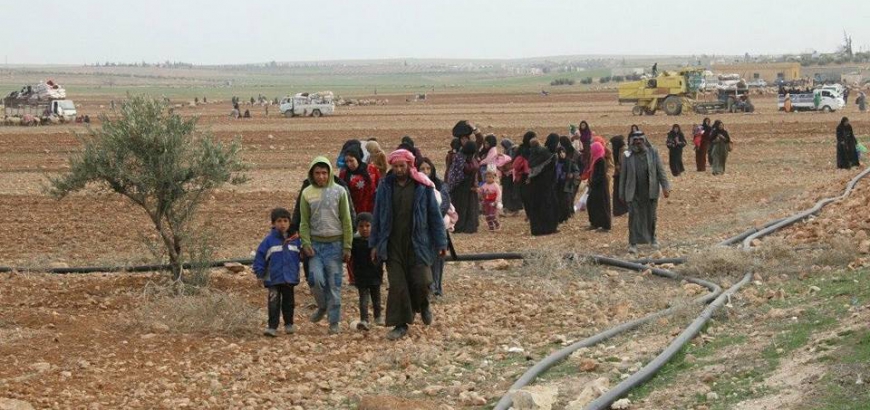After a journey that lasted days, suffering major hardship and facing the dangers of the road to escape areas under the control of the Islamic State (ISIS), most civilians from Deir-ez-Zor and Raqqa have been forced to stay in Kurdish YPG-run camps in the Raqqa and Hassakeh countrysides.
Annan, one of those living in the Qana camp in the southern Hassakeh countryside, told Alsouria Net that he had left his city of Deir-ez-Zor days earlier with the aim of staying with his son, who has been living in Hassakeh for years. But he was surprised to find himself blocked from entering the city and was forced to remain with his son in a camp for the displaced, complaining about poor services or the “lack thereof,” as he put it.
He added that he is 75 years old and that he suffers from ailments for which he received no help from Kurdish fighters to enter the city under the excuse that he hails from Deir-ez-Zor, which is under ISIS control. He says that he needs a Kurdish sponsor or a resident in Hassakeh who owns land in order to leave the camp.
He said that his son would go to one of the offices set up to distribute forged real estate documents, exploiting the needs of hundreds — and perhaps thousands — of displaced people who want to complete the sponsorship documents in order to enter the city.
Mohamad, a young man who recently left the same camp, confirmed to Alsouria Net the reports about the sale of forged real estate documents to those who want a sponsorship paper. But Mohamad criticized the method, stating that it requires a long time to complete, sometimes days or even weeks. He said that an important, and hardest, condition to meet is that the sponsor be direct offspring or descendants.
Regarding how he left the camp, Mohamad said that he was forced to take the smuggling route and to pay 100,000 Syrian pounds to be smuggled from the camp with his wife and child. He said that he left the personal identity cards belonging to him and his wife in the camp, “but I was forced to do that, because there was no alternative solution and because this route was taken before by many displaced people.”
A source close to the YPG militia, who asked not to be named, told Alsouria Net that the displaced camps under Kurdish administration were distributed between the Hassakeh, Qamishli and Raqqa countrysides, including Rishi and Al-Nirouz in Al-Malakiyah, which, established in 2003, is one of the oldest camps, with most of its residents being Iraqis. Other camps include Al-Karameh and Tel Abyad in the Raqqa countryside.
The source added that there was also the Al-Houl camp on the Qamishli-Hassakeh road, and that most of its residents are Iraqi as well. There is also Mabrouka near Ras al-Ain, as well as the Rajm al-Salibi checkpoint, which receives displaced people from Deir-ez-Zor before they are sent to camps or returned. He added that the latter have been subjected to numerous attacks by the ISIS, and that dozens of civilians have been wounded and killed in this way.
The source believed that the reason for the poor services in these camps was not the Kurdish administration, but due to the lack of aid. He said that donations had been gathered at various times from residents of Hassakeh and Qamishli in order to plug the aid gap in the camps.
But regarding the reason for not allowing civilians leaving ISIS-controlled areas to enter the city directly except with a sponsor, the source tied this to security needs, and likewise to accounts related to preventing “a number of arrivals dominating the original population.”
The source also stressed that disparities in services offered between camps was connected to the policies of certain countries and organizations, such as Turkey allowing the entry of aid and facilitating the work of international organizations, while this feature does not exist in the camps falling in “Kurdish areas in the Hassakeh or Qamishli countrysides.” On top of this, the large level of daily displacement exceeds the capacities of those responsible for issues of displaced people.
This article was translated and edited by The Syrian Observer. Responsibility for the information and views set out in this article lies entirely with the author.


